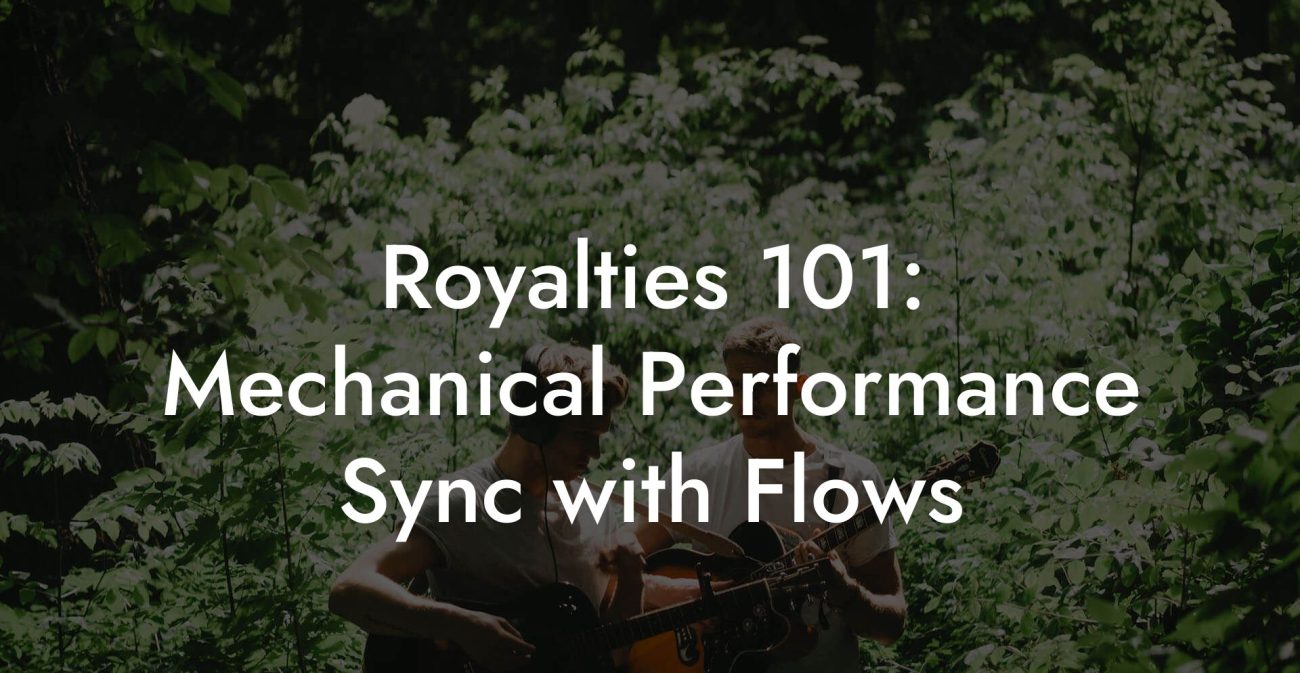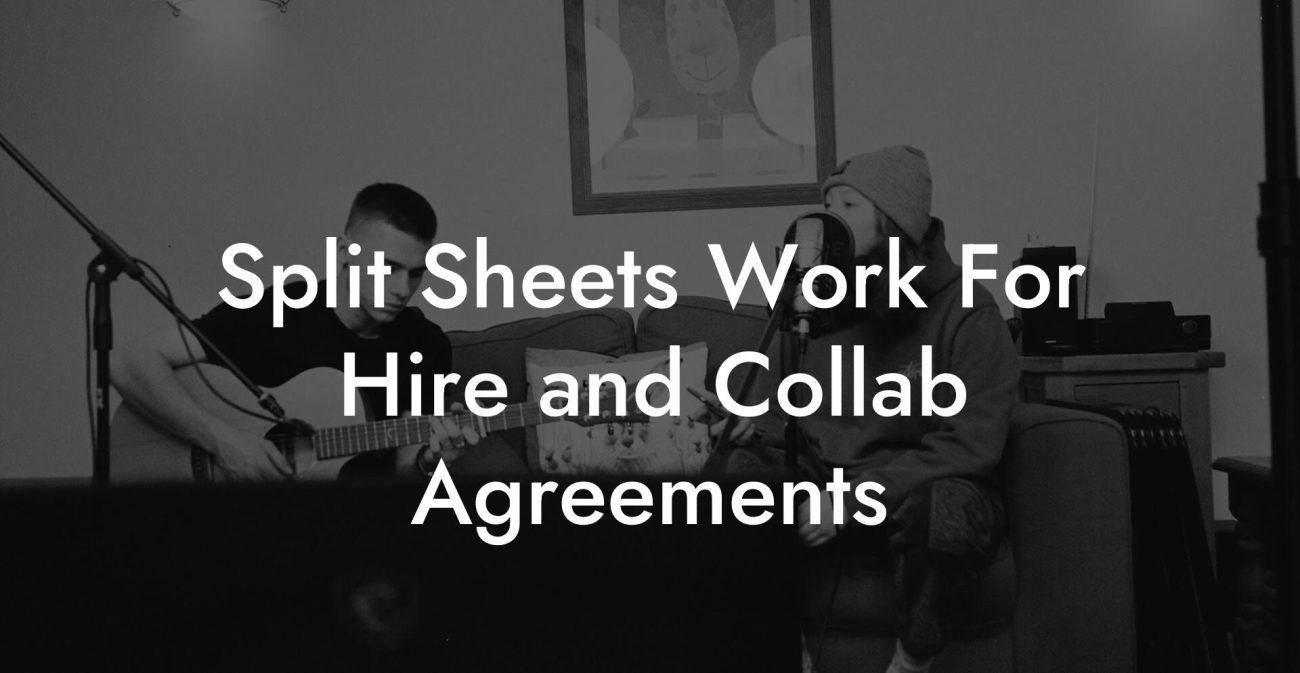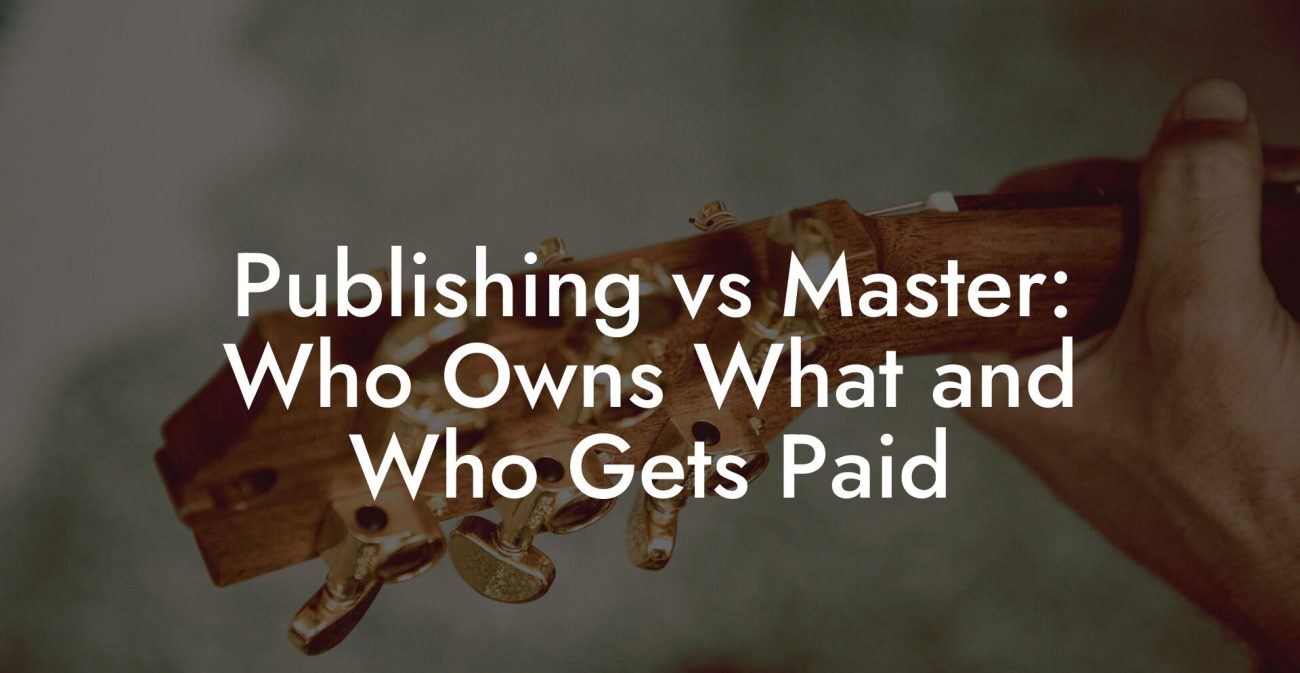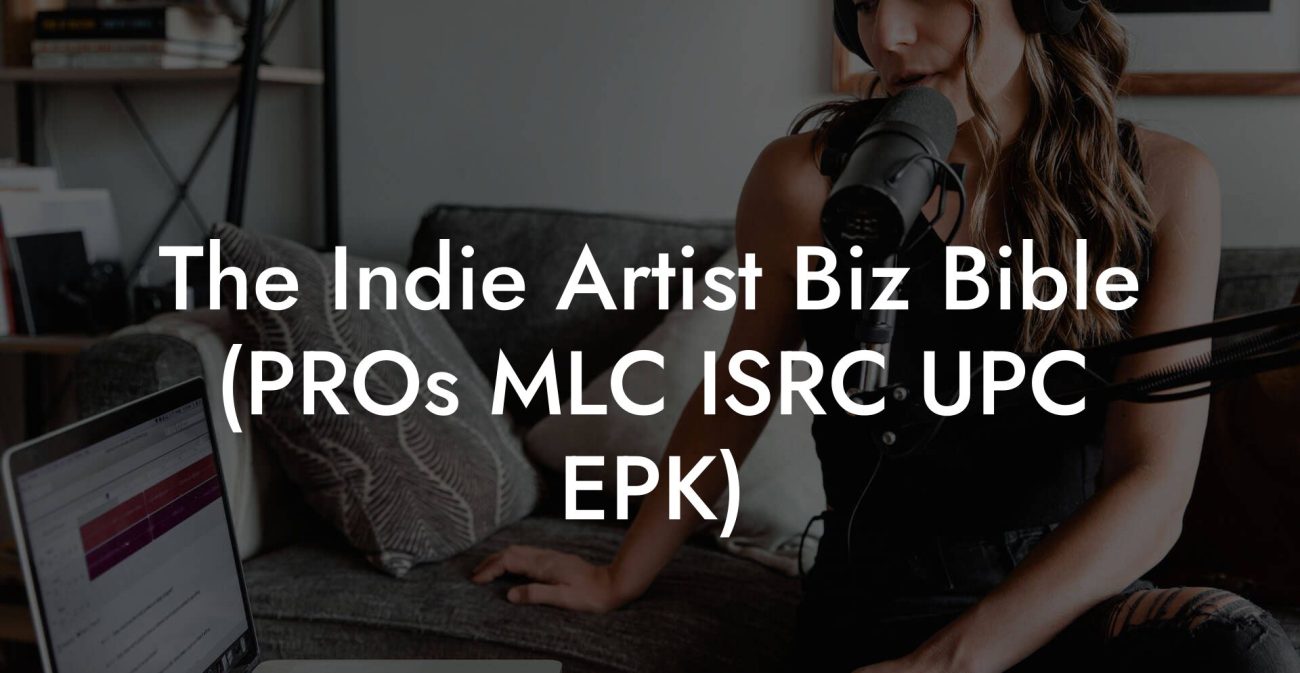Songwriting Advice
How to Register Songs: PRO MLC SoundExchange
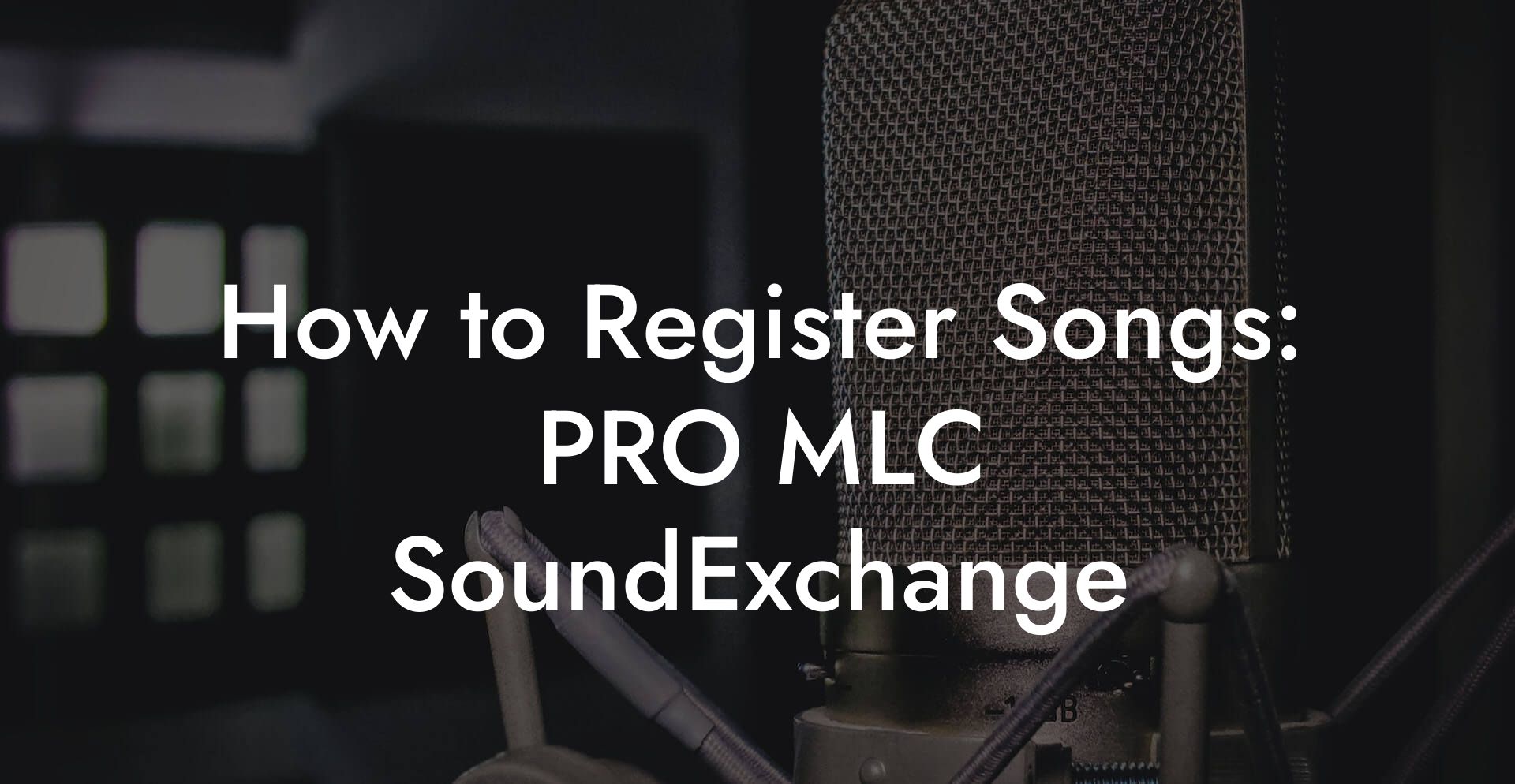
Welcome to the DMV for your music except less boring and way more profitable. If you write songs, perform on recordings, or own recordings you must register your work with the right organizations so money actually finds you. This guide walks you through performance rights organizations, the Mechanical Licensing Collective, and SoundExchange. You will learn what each does, who should sign up where, how to register songs and recordings, and what metadata you absolutely must get right to stop royalties from going into a black hole.
Quick Interruption: Ever wondered how huge artists end up fighting for their own songs? The answer is in the fine print. Learn the lines that protect you. Own your masters. Keep royalties. Keep playing shows without moving back in with Mom. Find out more →
Quick Links to Useful Sections
- Big picture first
- Who should sign up where
- Performance Rights Organizations explained
- Which PRO should you pick
- How to register a song with a PRO
- The Mechanical Licensing Collective or MLC explained
- Why you cannot ignore the MLC
- How to register your songs with the MLC
- SoundExchange explained
- Who gets paid by SoundExchange and how much
- How to register with SoundExchange
- What metadata actually matters and why
- Common problems and how to fix them
- Problem 1 Your song shows up on streaming but not on the MLC or PRO
- Problem 2 Your splits are wrong
- Problem 3 You signed a sync deal and your song is in a film but royalties are not being paid
- Step by step checklist for a new release
- Real life scenarios and what to do
- The DIY bedroom songwriter who does everything
- The co written hit with three writers and a producer
- The feature artist who is not the songwriter
- The songwriter signed to a major publisher
- Tips and tricks that actually help
- Common acronyms explained
- How payments actually flow and why you get gaps
- Checklist for release week
- FAQ
We will use plain language, real life examples, and a handful of jokes that are hilarious to you and slightly embarrassing later. You will finish smarter and more likely to be paid. Let us begin.
Big picture first
There are two main types of rights you need to track. One is about the songwriting piece. That is the melody and the words. People call that the musical work or composition. The other is about the recording of that composition. That is the actual audio file that lives on Spotify, Apple Music, a vinyl or a radio station. If you are a songwriter you care about the composition. If you are an artist on a recording you care about the recording. If you do both you care about both.
Three organizations matter in the United States for what most people call streaming and radio money.
- PROs Performance Rights Organizations. Examples are ASCAP, BMI and SESAC. These collect performance royalties for songwriters and publishers when a composition is publicly performed. That means radio plays, live shows, interactive streaming where a performance right is paid, television, restaurants and basically anywhere your song is heard in public as a composition.
- The MLC The Mechanical Licensing Collective. This organization collects mechanical royalties for composers and publishers for interactive streams and permanent downloads. Mechanical royalties are for the reproduction and distribution of compositions. If your song is streamed on Spotify or Apple Music the MLC covers the mechanical side in the United States.
- SoundExchange This collects digital performance royalties for the sound recording. That means non interactive streaming like satellite radio, internet radio services that act like radio and some other public performance uses of the recording. SoundExchange pays recording artists and rights holders for digital performance of the sound recording.
If that felt like alphabet soup you are right. Let us break each piece into human size bites with examples so you can act.
Who should sign up where
Short answer so you can go do it
- If you wrote the song sign up with a PRO as a writer and register your songs there.
- If you are an independent songwriter who self publishes you should register as a publisher with a PRO or assign your publisher share correctly so you get paid for both writer and publisher shares.
- If you want mechanical royalties from US streams sign up at the MLC or make sure your publisher does and register your compositions there.
- If you performed on a recording or you own the master recording register the recording with SoundExchange to collect your digital performance royalties for the recording.
Now the fun part. The details and the receipts so you actually get checks or direct deposits instead of vibes and prayers.
Performance Rights Organizations explained
Think of a PRO as a collection agency for the composition part of your song. When a radio station plays the song the PRO monitors that station and collects money. When restaurants and stores play music the PRO makes sure songwriter money is flowing. When a TV show uses your song the PRO collects the money owed to the writer of the composition.
Which PRO should you pick
In the United States the main players are ASCAP, BMI and SESAC. Each has pros and cons but the most important thing is to join one as early as possible. You cannot belong to two of them for the same writer role. You can belong to one as a writer and a different one as a publisher but that is advanced and rarely necessary at first.
- ASCAP American Society of Composers Authors and Publishers. Writer friendly and historically transparent. Free to join with online signup.
- BMI Broadcast Music Incorporated. Also free to join for writers and has a long history with radio friendly payouts.
- SESAC Third Wave rights company. Invitation only for writers traditionally but recently they updated criteria and offer more curated services. SESAC pays differently and sometimes faster for certain catalogs.
Pick one and sign up now. This is not a life partner. You can switch later but switching is messy. Most recommended route for a new writer is to compare user interfaces and resources and choose one. If you have a publisher they may insist on a particular PRO. If you live outside the United States look up the local collection society. For example PRS in the United Kingdom or SOCAN in Canada.
How to register a song with a PRO
Every PRO has a portal. Sign up as a writer. Some ask you to sign up as a publisher if you own publishing. If you do not claim publisher rights the publisher share may go to your label or an administrator. Here is the checklist of facts you need for a clean registration.
- Song title exactly as you want it displayed. Keep it consistent. Capitalization matters less than exact punctuation and spacing.
- All writers names and their respective shares expressed as percentages. If you split a song three ways mark shares like 50 25 25 or 34 33 33. The PRO needs to know who is owed what.
- Publisher name and publisher share splits. If you self publish that is your business name or your legal name used for publishing. If you signed a publishing deal the publisher will register songs and claim a share.
- IPI or CAE numbers for each writer and publisher if you have them. IPI is the interested parties information number used internationally to identify song rights holders. Do not panic if you do not have one. PROs will assign identifiers. But eventually you want an IPI because it helps global collection.
- Recording details for reference like release date and label. This helps matching plays to recordings.
Example scenario
You co write a song with your friend Sam and Sam produced the track. The split was agreed as 60 for you and 40 for Sam. You self publish. To register with a PRO you log into your account, add the song title, list you and Sam as writers with your splits, list your publishing name and decide who will register as the publisher. If you self publish you sign up for publisher account if the PRO requires it. If Sam also wants to collect producer related mechanical or neighboring rights he may register separately depending on his role.
The Mechanical Licensing Collective or MLC explained
Mechanical royalties are the payments for reproduction of a composition. This includes interactive streaming where users choose what to play on demand and downloads. The rules in the United States changed in recent years and the MLC was created to handle mechanical royalties for digital service providers like Spotify Apple Music Amazon and others. Think of the MLC as the machine that keeps track of which songs were streamed and makes sure mechanical money gets sent to the right publishers and songwriters.
If you are a publisher or an independent songwriter who wants mechanical royalties from US services you must register with the MLC and ensure your songs are registered correctly. If you are an international writer with no US publisher you should still register because the MLC can route payments to you or your society.
Why you cannot ignore the MLC
If you only register with a PRO that registers you for performance rights you will still be missing mechanical royalties generated by interactive streaming in the United States. That is money that can be sizable over time. The MLC also handles the new matching of user played streams to works and allocates unmatched money into a pot that can be claimed later. Do you want to be the person claiming that pot or the person who watches it get reallocated to someone else? Exactly.
How to register your songs with the MLC
The MLC accepts registrations from songwriters and publishers. If you are self published you need a publisher account. The basic metadata the MLC needs is similar to a PRO but with extra details for mechanical matching.
- Song title exactly as released.
- All writers and their shares in the composition.
- All publishers and their publisher shares. Publisher and writer shares should add up correctly to the whole composition. Mechanical splits can vary by territory but in the United States the MLC needs the accurate split for US mechanical payments.
- ISWC if you have it. That is International Standard Musical Work Code. If you do not have one you can still register and the MLC may assign one later.
- Recording details such as release date, album name, and the release identifier used by the digital service like the recording identifier or the release platform UPC. These help match the composition to the recording streams.
- ISRC codes for the recordings if available. ISRC is the identifier for the recording and helps the MLC link a streamed file to the composition.
Example scenario
You wrote and self released a single on Bandcamp and distributed it to streaming platforms via a digital distributor. You registered the song with your PRO for performance. For the MLC you create a publisher account under your publishing name. You register the song with exact writer shares and add the ISRC for the streaming file. You confirm the publisher share which is the portion mechanical money will route to the publisher. If you want to collect both writer and publisher mechanical shares you must set that up with the appropriate accounts or agreements.
SoundExchange explained
SoundExchange is the organization that collects and pays digital performance royalties for sound recordings. That sounds like a lot a bureaucracy. Translation in plain language. If your recording is played on satellite radio internet radio curated streaming stations that stream like radio or some non interactive services SoundExchange collects money and pays the recording artist and the owner of the sound recording. This is not the same as the composition payments collected by PROs or the mechanicals collected by the MLC.
SoundExchange splits payments between the featured artist and the rights owner. The featured artist is typically the performing artist. The rights owner is often the label or the independent artist if they own the master.
Who gets paid by SoundExchange and how much
When an eligible non interactive performance happens SoundExchange divides the collected money into parts.
- A portion goes to the performing artist. If there are featured artists this gets split among them following documented agreements.
- A portion goes to the rights owner of the recording which is usually the label or independent artist who owns the master.
- A small portion is set aside for non featured performers via a special fund when applicable. This can include session musicians and backup singers if they are registered and eligible under certain conditions.
Important note for indie artists. If you do not register your recording with SoundExchange you will not receive these digital performance royalties even if your song streams millions of times on qualifying services. Register the recording. That is the difference between money arriving and nothing arriving.
How to register with SoundExchange
SoundExchange wants accurate recording metadata so they can match performances to payees. Here is what you need.
- Account as either an artist or a rights owner. You can create separate accounts for each role. If you are both the performing artist and the master owner you should claim both roles and submit documentation.
- Recording title and release date.
- ISRC for each recording. If you are the rights owner you should assign ISRCs when you release a recording. Distributors often assign ISRCs but if you own the master you should confirm who controls that code.
- Featured artist credits exactly as they appear on the recording. Include real names and stage names.
- Session musician credits if you want to be eligible for the non featured performers fund.
- Label name or rights owner name and documentation proving ownership if required.
- Bank and tax information for payment. SoundExchange pays by direct deposit and issues tax forms for US payments.
Example scenario
You are an independent producer who released a single through a digital distributor. You own the master. You create a rights owner account with SoundExchange and register the ISRC for your track. You also register as the featured artist so you can receive the artist share. You add your bank details and fill out tax forms. When internet radio services perform the recording SoundExchange will match plays to the ISRC and route money to both the artist account and the rights owner account that you control.
What metadata actually matters and why
Metadata is the secret sauce that tells payment systems who to pay. Garbage metadata equals lost royalties or delayed payments. Invest five minutes now to get this right and stop chasing money like a raccoon chasing a pizza slice.
- Exact spelling for names. Use the legal name used on your tax form for payouts and use your artist name for credits. If you have an accented character test how the portal accepts that input.
- Consistent punctuation and spacing for song titles across PRO MLC and SoundExchange.
- ISRC codes for recordings. These identify the audio file and are used by SoundExchange and distributors to match plays.
- ISWC for compositions where available. This helps global collection but not all services require it.
- Publisher names and publisher accounts. If you do not list a publisher properly you may lose publisher share of mechanicals.
- Split percentages that add to 100 percent for both writer and publisher sides. Ambiguous splits cause delayed payment and disputes.
Common problems and how to fix them
Problem 1 Your song shows up on streaming but not on the MLC or PRO
Streaming platforms can upload music without correct composition metadata. The song can be living in a vacuum. To fix it get your release ISRC and UPC code from your distributor. Use that to match the streaming file to your composition when you register at the MLC and your PRO. If you are missing ISRCs contact your distributor. If the composition is unclaimed on the MLC claim it and upload correct splits.
Problem 2 Your splits are wrong
Splits that do not match across PRO MLC and publisher records will create unmatched money. Always agree splits in writing with co writers before release. Use a split sheet or a simple email with explicit percentages. If you need to change after registration contact your PRO and the MLC and update publisher records. Note that retroactive payment depends on how services report plays and timing of the change. Fix it quickly and keep the paper trail.
Problem 3 You signed a sync deal and your song is in a film but royalties are not being paid
Sync fees are direct money paid by the licensee to the publisher or writer and do not always flow through PROs or the MLC. Make sure your sync agreement states who will register the use with PROs and what splits apply. If performance royalties should be paid for broadcast or streaming of the film ensure the film credits include exact song titles and writers and that the broadcaster reports cue sheets to PROs. Cue sheets are the lists of music used in a TV or film episode that PROs use to allocate performance royalties. No cue sheet equals no money.
Step by step checklist for a new release
Use this checklist like a cheat code. Follow the items and stop blaming fate for missing royalty checks.
- Decide your legal publishing structure. Will you self publish or use a publishing company. If self publishing pick a clear publishing name and bank account.
- Join a PRO as a writer. Register your personal account and add your legal name and any stage names for credits.
- Sign up at the MLC as a publisher if you self publish. If you have a publisher ask them to register. Do not assume your distributor will do this for you.
- Register your recordings with SoundExchange. Claim artist and rights owner roles as applicable. Add ISRCs for all recordings.
- Create a split sheet for each song and save it. Include writer names, email addresses, IPI numbers when you have them, and exact percentages. Keep a copy with your release assets.
- Enter the exact same song metadata across your PRO MLC and SoundExchange accounts. Check spelling and punctuation. Verify that writer shares and publisher shares add up correctly.
- Upload or record ISWC numbers if available. Ask your PRO to assign one if needed.
- Confirm bank and tax information for payouts in every account. SoundExchange and some PROs will not pay until tax forms are completed.
- Monitor your account dashboards for claims and unmatched plays. Respond to queries from your PRO or the MLC fast. Often a small answer unlocks a large payment.
Real life scenarios and what to do
The DIY bedroom songwriter who does everything
You write the song you record the track you release it on streaming platforms and you do your own beats. You must sign up with a PRO as a writer and a publisher if you want publisher money. Sign up at the MLC as a publisher to collect mechanicals for US interactive streaming. Register the recordings with SoundExchange for performance royalties for the master. You control your destiny and your admin paperwork. Set aside a time to maintain these accounts every month and check for unmatched payments.
The co written hit with three writers and a producer
You and two others wrote a chorus and a verse. The producer added a musical element that qualifies for a writing share. Before release get a split sheet confirming 40 20 20 20 or whatever you agreed. Register the song at your PRO with those splits. Make sure the publisher shares in your MLC registration match what was agreed. If one co writer has a publishing deal you need to confirm their publisher will register the share and get credited by the MLC. Coordination prevents fights and missing money.
The feature artist who is not the songwriter
Label releases a track where you are the featured vocalist but you did not write. You will earn SoundExchange artist royalties because you performed. You will not earn composition royalties unless you have written. Ensure your featured artist credit is added when the recording is registered at SoundExchange so you receive your artist share. If you get session work register with SoundExchange too so you can be eligible for non featured performer distributions if applicable.
The songwriter signed to a major publisher
Your publisher will typically handle MLC registration and PRO publishing registrations. You still need to sign up with a PRO as a writer to collect your writer performance share. Confirm with your publisher what they are registering and ask for copies of registrations. Keep your own record of splits and songwriting agreements so you can audit if payments do not match expectation.
Tips and tricks that actually help
- Use consistent capitalization and punctuation for your song titles across platforms. Small differences create unmatched records.
- Save split sheets in plain text and PDF and include email confirmations from co writers. This paper trail solves disputes and speeds corrections.
- Use the exact same songwriter name across PRO MLC SoundExchange and distribution services. If you use a stage name add it as an alias in your accounts but keep legal name for payment forms.
- If you are paid in another currency remember currency conversion and tax treaties matter. Look up whether your PRO sends money directly to your home society and how exchange rates are handled.
- Set calendar reminders to check unmatched money reports at the MLC and PRO portals. Match claims early and you will get paid faster.
- When in doubt contact support and reference ISRC ISWC and exact timestamps for the performance event. The right metadata gets a ticket to a fast resolution.
Common acronyms explained
- PRO Performance Rights Organization. Collects composition performance royalties.
- MLC Mechanical Licensing Collective. Collects mechanical royalties for interactive streaming in the United States.
- SoundExchange Collects digital performance royalties for sound recordings from non interactive streaming services and pays performing artists and rights owners.
- ISRC International Standard Recording Code. A unique identifier for a specific recording of a song.
- ISWC International Standard Musical Work Code. A unique identifier for the composition or songwriting work.
- IPI Interested Parties Information. A number used to identify song rights holders internationally.
- UPC Universal Product Code. The bar code for a release as distributed to stores and streaming platforms.
How payments actually flow and why you get gaps
Understanding the pipeline reduces panic. Here is a simplified flow.
- User streams a song on Spotify. Spotify owes both mechanical and performance money depending on country and type of stream and reporting.
- The MLC receives mechanical reporting or claims and allocates mechanical royalties to publishers and writers for US streams.
- The PRO receives performance reports and pays writers for public performance depending on reporting sources such as radio or venue reporting. For interactive streams PROs also collect performance royalties depending on territory.
- SoundExchange receives performance reports for the sound recording from non interactive services and pays the featured artist and rights owner.
Gaps happen when a streaming service reports incomplete metadata or uses a different title or name. Gaps also happen when splits do not match across systems. The fix is matching metadata and consistent registration. The MLC and PROs sometimes hold unmatched money for a period if they cannot confidently assign it. Claim it and you get paid. Ignore it and someone else might claim it or the money could stay pooled until an audit.
Checklist for release week
- Final split sheet signed by all writers and publishers.
- ISRC assigned and confirmed with distributor and SoundExchange registration completed.
- Song registered with your PRO with exact writer information and shares.
- Song registered with the MLC with publisher shares and release metadata including ISRC.
- SoundExchange registration completed for the recording with artist credits and rights owner details.
- Bank and tax details filled in for all accounts so payments are not delayed.
- Backup all registration confirmations and save the screenshots in a folder named Royalties and another copy in the cloud.
FAQ
Do I need to register with a PRO and the MLC
Yes if you want to collect both performance and mechanical royalties in the United States. PROs collect public performance money for the composition and the MLC collects mechanical royalties from interactive streaming and downloads. Each organization covers different rights so you need both for full coverage.
Will SoundExchange pay me for Spotify streams
Probably not for the type of Spotify stream most fans use. SoundExchange pays for non interactive digital performances like internet radio that behaves like radio and satellite radio. Interactive on demand services like Spotify and Apple Music generally route recording royalties through different channels such as direct deals and the mechanical process handled by the MLC for compositions. You still want SoundExchange if your recording plays on internet radio or satellite services.
What happens if I do not register my song anywhere
If you do not register you will likely lose money. Some money may go to publishers or may be held in unmatched pools. You will have to claim payments retroactively which is slow and sometimes impossible depending on reporting and data retention. Register early and accurately to avoid that painful cleanup.
Can I register songs retroactively
Yes in most cases but you will need strong documentation. The sooner you claim the easier it is to recover royalties. Some organizations have deadlines for claiming unmatched money so act fast when you notice missing payments.
How long does it take to get paid
Timelines vary. PRO payments are periodic and can take months from first usage because of reporting cycles. The MLC receives monthly usage reports and distributes after matching and processing which can take a few months. SoundExchange pays quarterly and the timeline depends on reporting from services. Expect delays and check dashboards for estimated payout dates.
Do I need a lawyer
Not to register songs. Registration is a do it yourself task for most independent artists and writers. For complex publishing deals sync agreements or disputes you should consult an entertainment lawyer. That said small legal templates and clear split sheets signed by everyone are inexpensive insurance.

